Many dogs like water but, of course, there are exceptions.
Certain dog breeds dislike swimming because their bodies are simply not built for it. They struggle to stay afloat, breathe normally, or regulate their temperature, turning swimming into an unpleasant experience.
That’s why you should always consider your pal’s physical characteristics before taking them to the beach or pool. This list of the top 15 dog breeds that hate swimming and the water should help.
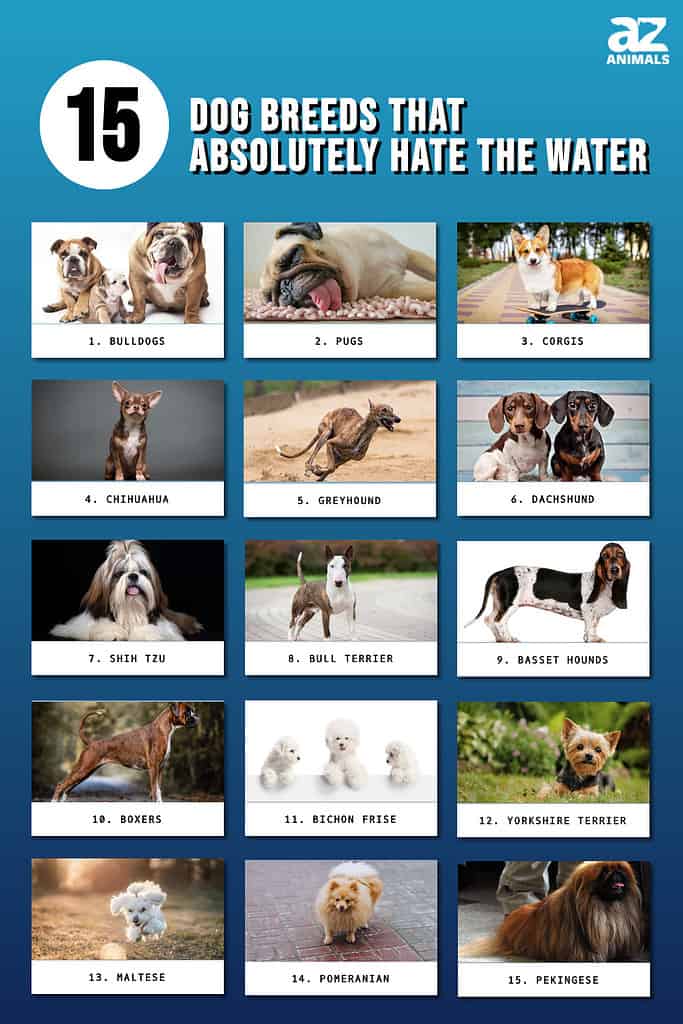
#1 Bulldogs
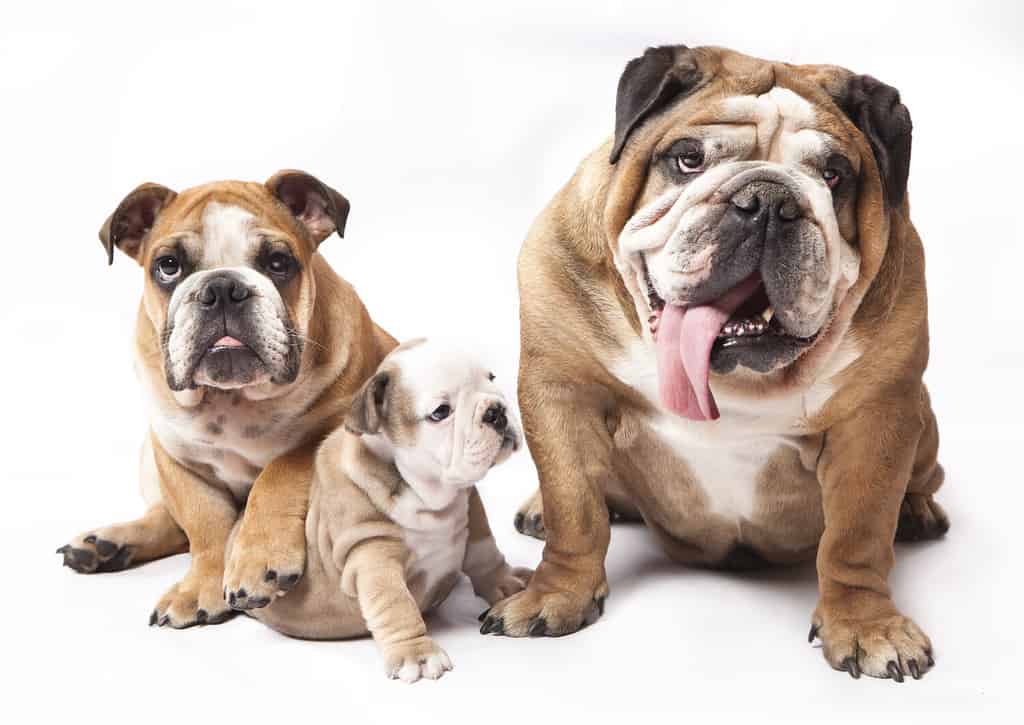
Neither French nor English bulldogs are very good swimmers.
©Liliya Kulianionak/Shutterstock.com
Bulldogs don’t just dislike swimming. They’re actually quite bad at it, too, as their body simply isn’t built for this activity.
Both French and English bulldogs are heavily built with short legs and a pushed-in nose, which makes it challenging for them to stay afloat, move in the water, and breathe properly while swimming.
So, a gold medal for swimming may not be in their future, but these doggies will still very much enjoy out-of-water activities.
#2 Pugs
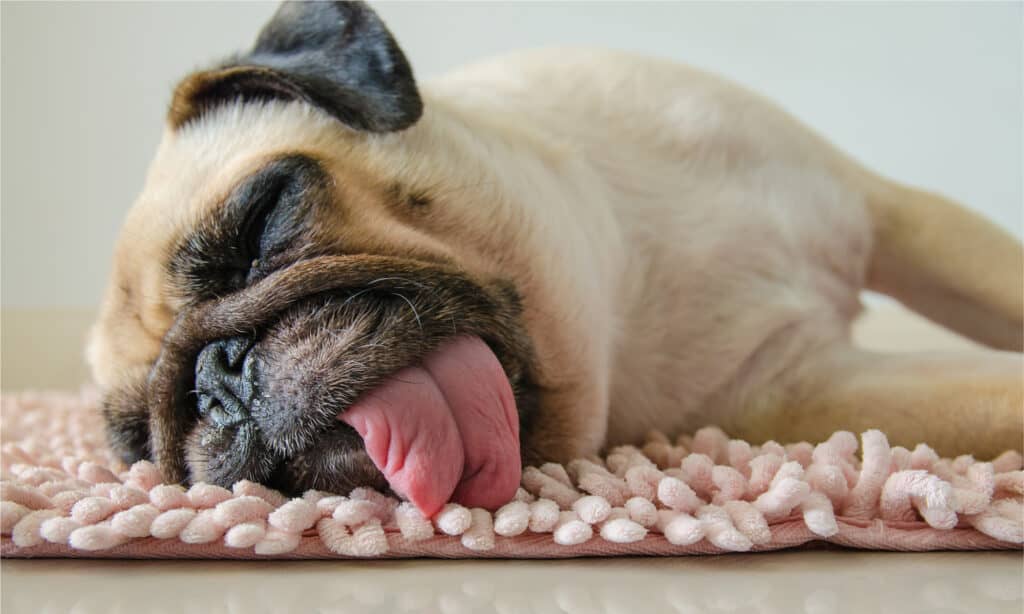
Pugs prefer to take it slow and relax rather than exert themselves by swimming.
©fongleon356/Shutterstock.com
Much like bulldogs, pugs are a small breed with short snouts. This often causes trouble with breathing, especially underwater, so they’re not likely to enjoy swimming. Additionally, pugs tend to overheat when active, so swimming can make it difficult for them to regulate their body temperature.
#3 Corgis
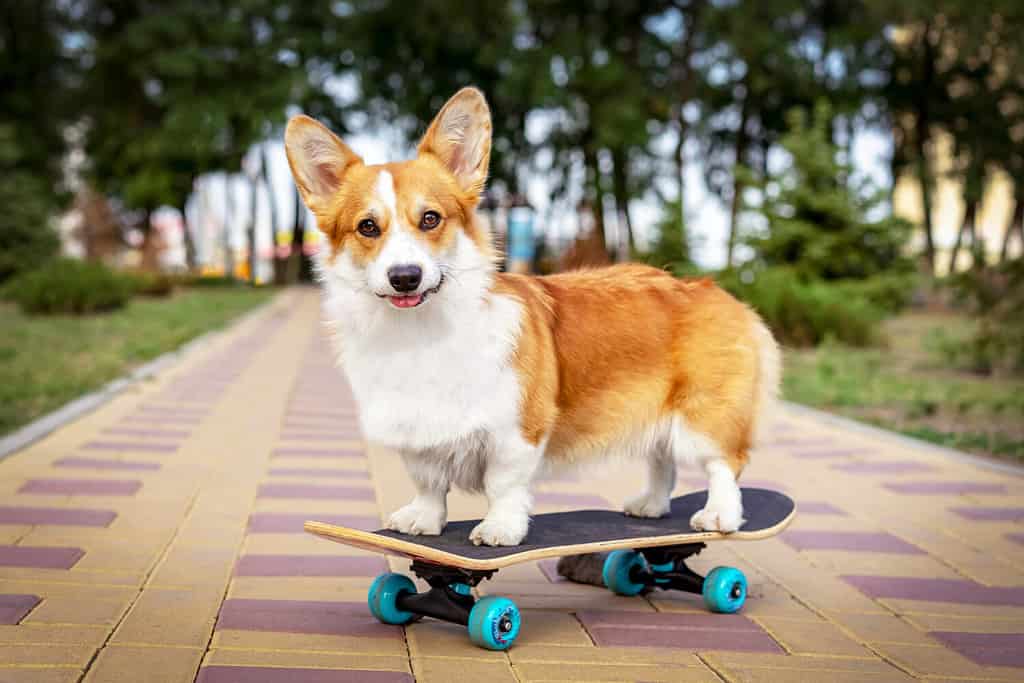
Fun-loving corgis won’t hesitate to get wet, but they may not be the strongest swimmers!
©Masarik/Shutterstock.com
Most corgis actually like splashing and playing in shallow water, but their physical build isn’t ideal for swimming.
Their elongated torso, low stature, and disproportionally short legs are particularly challenging, making it hard for corgis to keep their heads above water when paddling.
#4 Chihuahua

Chihuahuas may be energetic and feisty, but the water isn’t their ideal playground.
©Al_Er/Shutterstock.com
Chihuahuas typically don’t feel comfortable in the water, and their small stature doesn’t exactly qualify them as world-class swimmers. They also have a low tolerance for cold temperatures, so they can get chilled very easily and quickly in the water.
#5 Greyhound
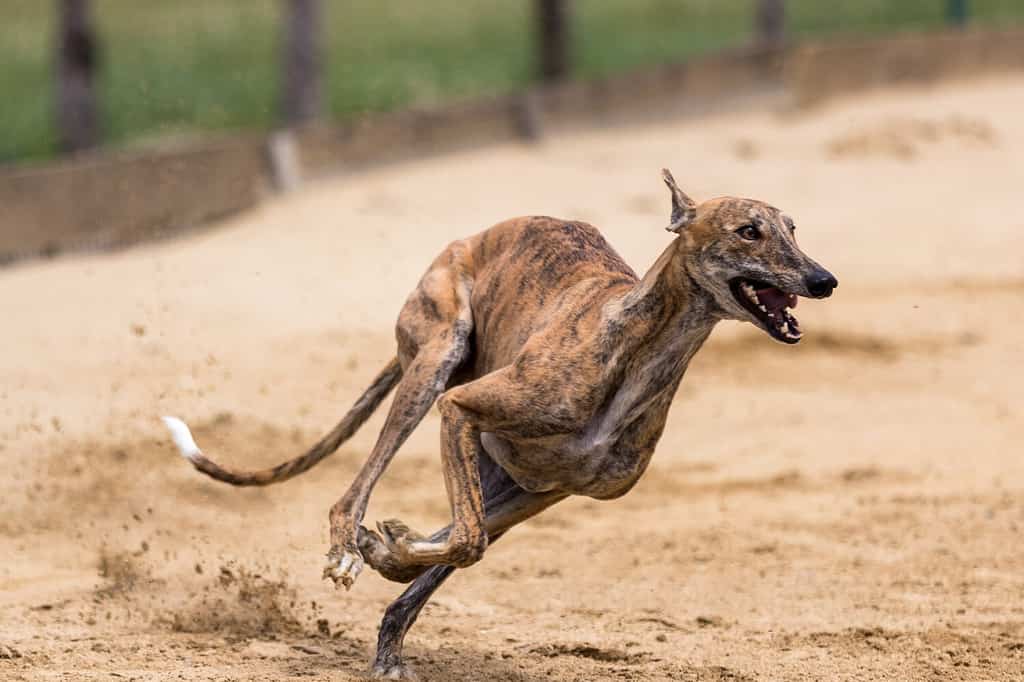
Greyhounds are great athletes, but swimming isn’t their forte.
©Nipun Maduwantha/Shutterstock.com
Greyhounds may be known for their athletic abilities, but swimming is not their sport of choice. In fact, being in the water, especially under the hot sun, may negatively affect this breed.
Since greyhounds have very thin coats and skin, they find it difficult to stay warm while in the water and are also more susceptible to sunburn — and, as we know, the sun’s effects are amplified in and around water. So, activities like swimming can do greyhounds more harm than good.
#6 Dachshund

Dachshunds aren’t built for swimming, but that doesn’t take away from their cuteness!
©Luiza Kleina/Shutterstock.com
Dachshunds, also called “weiner dogs,” are best known for their unusual body shape, which is precisely the reason why they don’t like swimming and the water.
Their odd body shape makes it difficult for them to stay afloat, with deep waters being especially dangerous for their low-to-the-ground stature.
#7 Shih Tzu
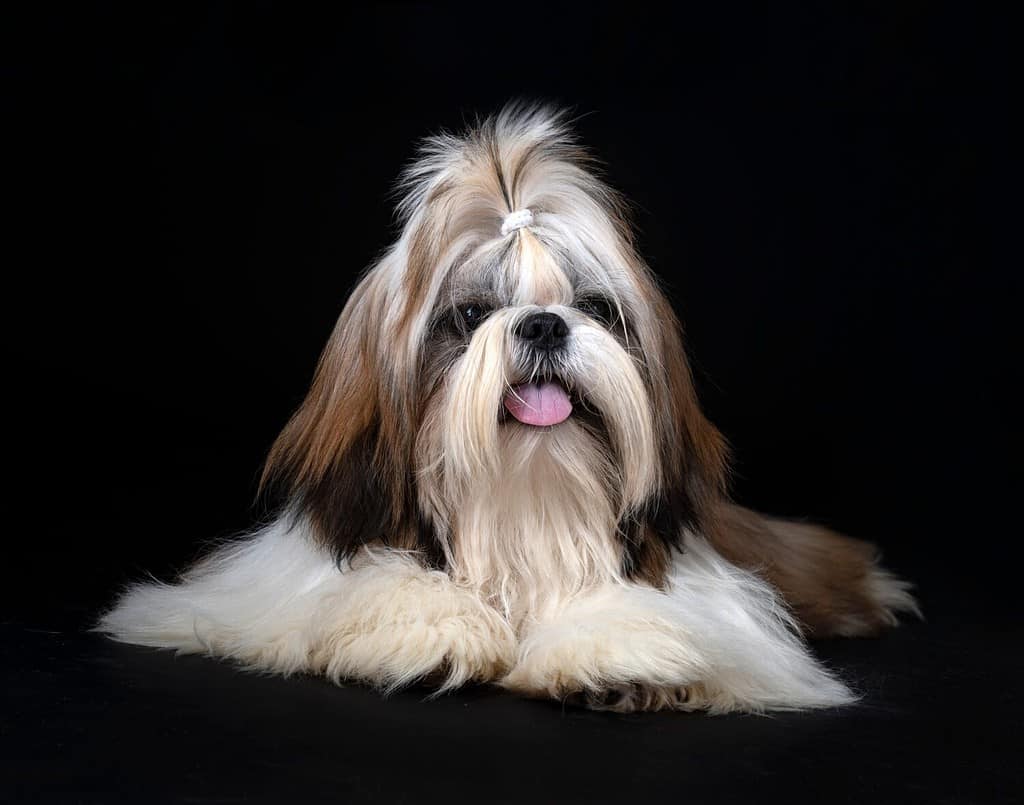
Shih
Tzu’s long hair can be especially problematic in the water.
©cynoclub/Shutterstock.com
Shih Tzus, unfortunately, have a lot of things going against them when it comes to swimming.
Like most small breeds, they struggle with keeping their head above the water and generating enough force to propel themselves in their desired direction. On top of that, they also have long and full coats that may weigh them down or cover their noses and mouths while swimming, making it harder for them to breathe.
#8 Bull Terrier
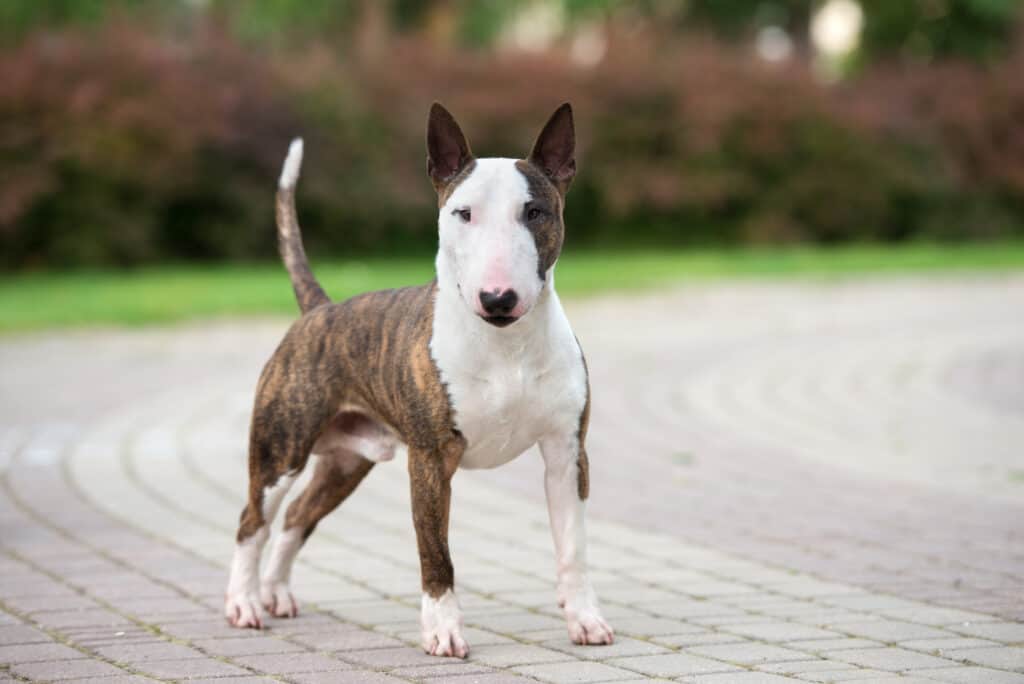
Bull terriers may enjoy frolicking in shallow water, but won’t be the most competent swimmers.
©otsphoto/Shutterstock.com
Bull terriers are also not the best swimmers due to their dense build, short legs, and disproportionately heavy heads.
The good news is they have other characteristics that may compensate for these drawbacks, with their muscular bodies and fearless nature as their top assets. Proper training, positive reinforcement, and a little patience may go a long way with this breed!
#9 Basset Hounds
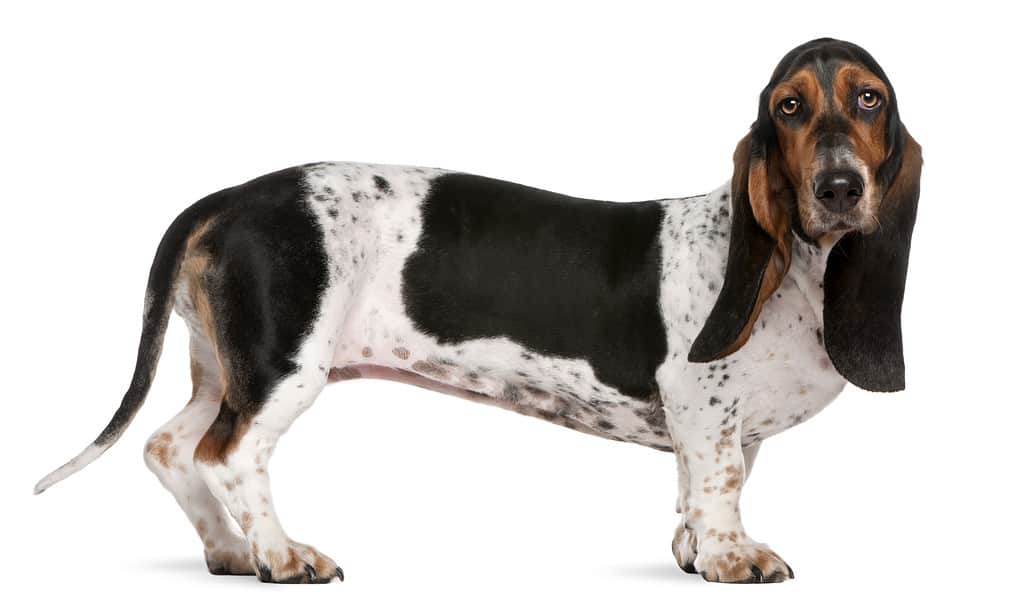
Basset hounds are comfortable with water, but shouldn’t swim long distances on their own.
©iStock.com/GlobalP
Basset hounds are also somewhat limited by their small stature, long body, and short legs. They can swim and usually won’t mind the water too much — but they’re just not good swimmers.
So, if you still want to take them to the beach or pool, make sure to take the necessary precautions and not let them get too far away from you.
#10 Boxers
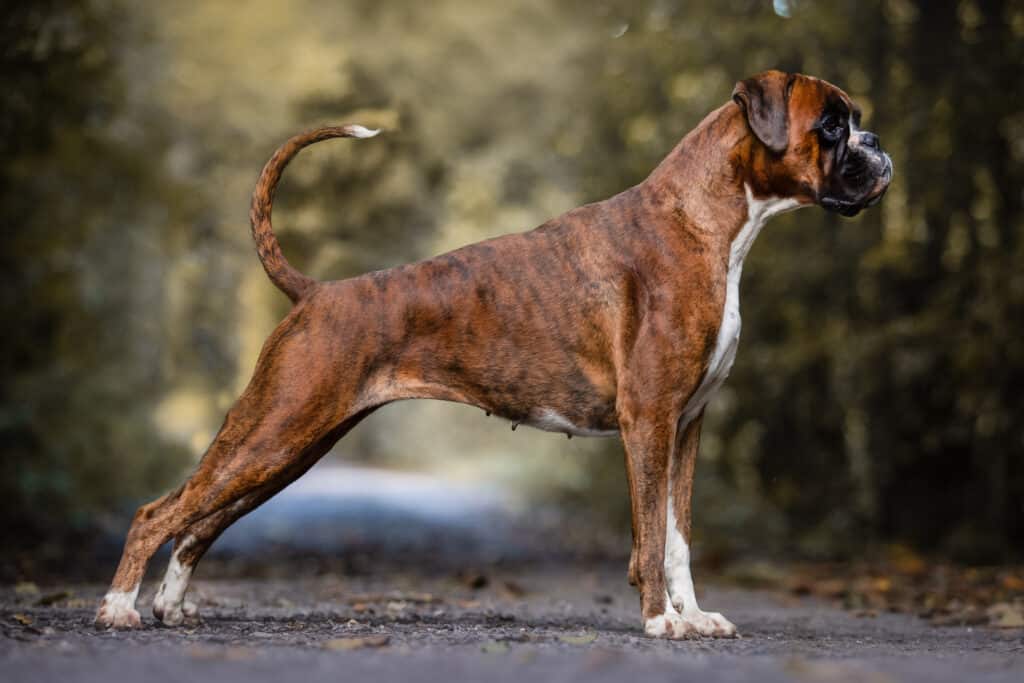
Even with their athletic build, an average boxer won’t be the next Michael Phelps.
© nik174/Shutterstock.com
Despite their confident and energetic personalities, boxers aren’t likely to enjoy swimming. Most of them are simply not fond of water. Also, much like greyhounds, boxers are likely to feel cold in the water due to their short coat that doesn’t provide much insulation or protection.
#11 Bichon Frise
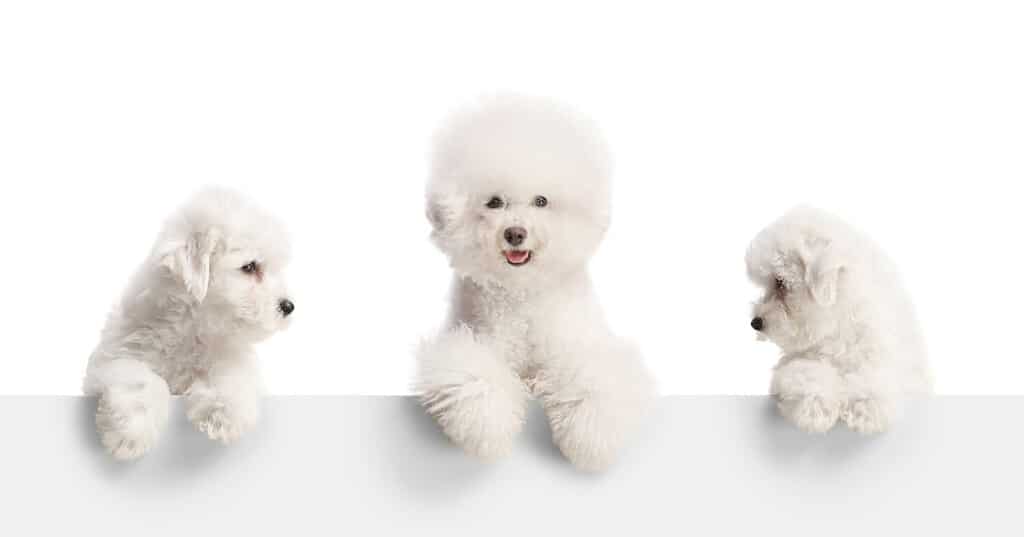
In French,
bichon à poil frisémeans
curly lap dog, so don’t expect them to be the best athletes or swimmers.
©Ljupco Smokovski/Shutterstock.com
Swimming is not the forte of fluffy bichons. They have a low gravity center due to their stocky build, which makes paddling difficult. Their thick, curly coats also don’t make for great “swimsuits,” as they tend to absorb water and weigh them down.
So, while most bichons may tolerate a quick dip, they’ll almost always prefer taking a detour rather than diving into water activities.
#12 Yorkshire Terrier
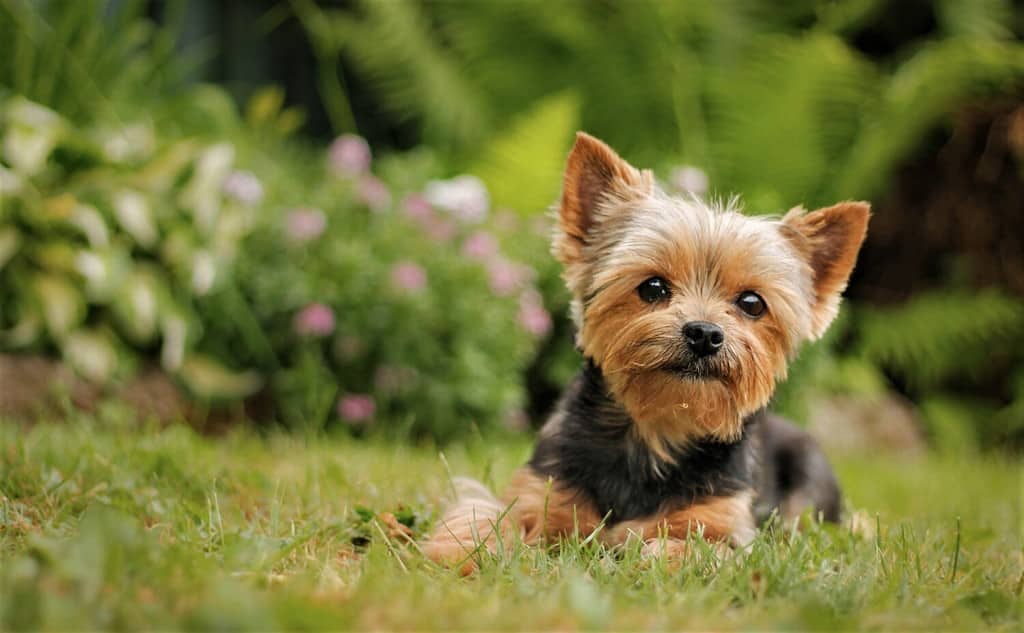
Yorkies may be more fond of indoor baths than swimming.
©Shllabadibum Bubidibam/Shutterstock.com
Yorkies’ tiny legs may look cute, but they offer minimal propulsion in the water. This makes it difficult for them to navigate it and stay afloat.
Their (typically) long, silky coat doesn’t help either, as it tends to get soggy when wet and makes swimming downright unpleasant for the pupper.
So, while Yorkies bravely venture into “the great indoors’” bathtubs, they’d probably prefer to observe larger dogs swimming from a safe distance.
#13 Maltese
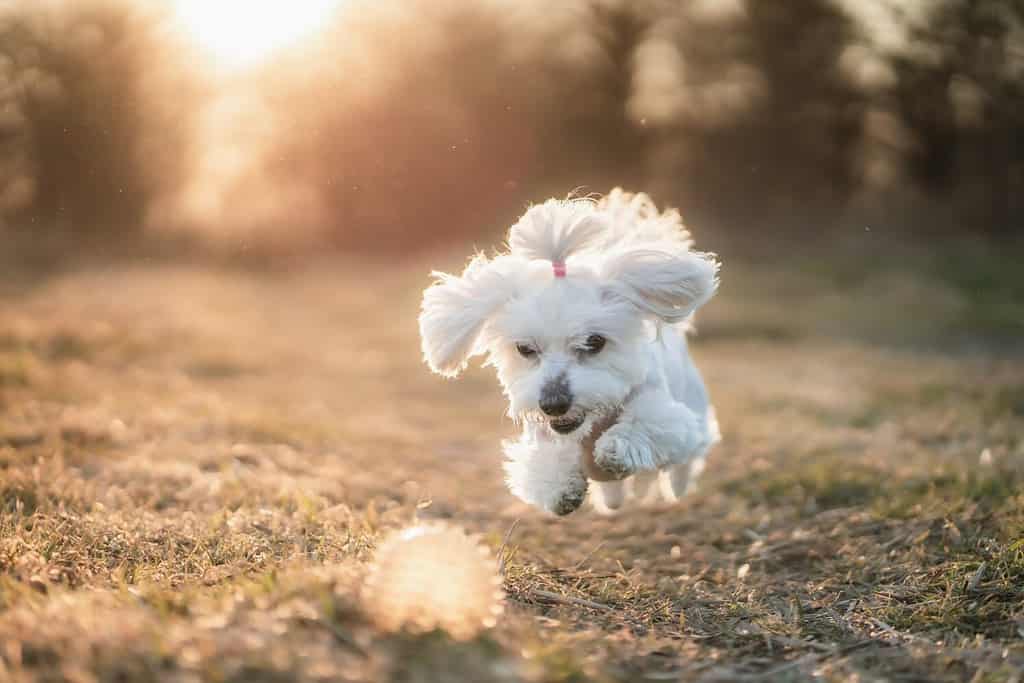
Maltese dogs are at their most playful on firm ground.
©fotovideoslk/Shutterstock.com
Due to their similar build, Maltese tend to have similar struggles with swimming as their Bichon counterparts.
But Maltese are also somewhat smaller, with their height varying between just seven and nine inches. Like many smaller breeds, they are more prone to collapsing tracheas as they age, and swimming could actually speed up this process as it causes heavy breathing. So, avoid forcing your Maltese to swim unless they show initiative.
#14 Pomeranian
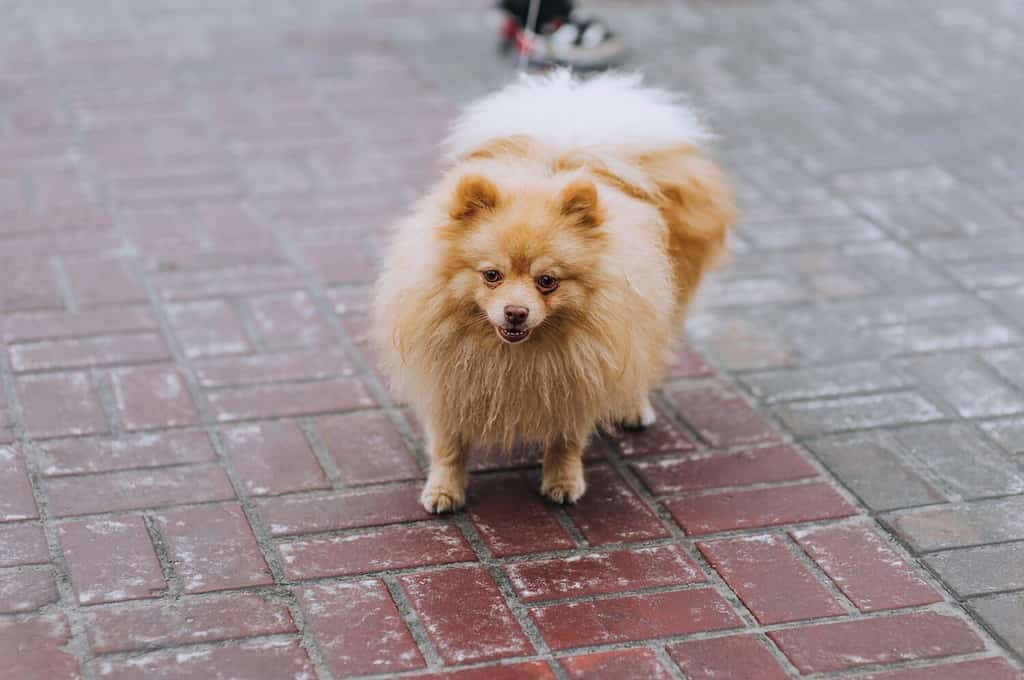
Pomeranians and water don’t mix well.
©Shchus/Shutterstock.com
Pomeranians typically don’t like getting wet and don’t have the strength nor the stamina to become really strong swimmers. Much like Maltese, they’re also susceptible to weakened tracheas and should generally avoid swimming, especially for longer periods.
#15 Pekingese
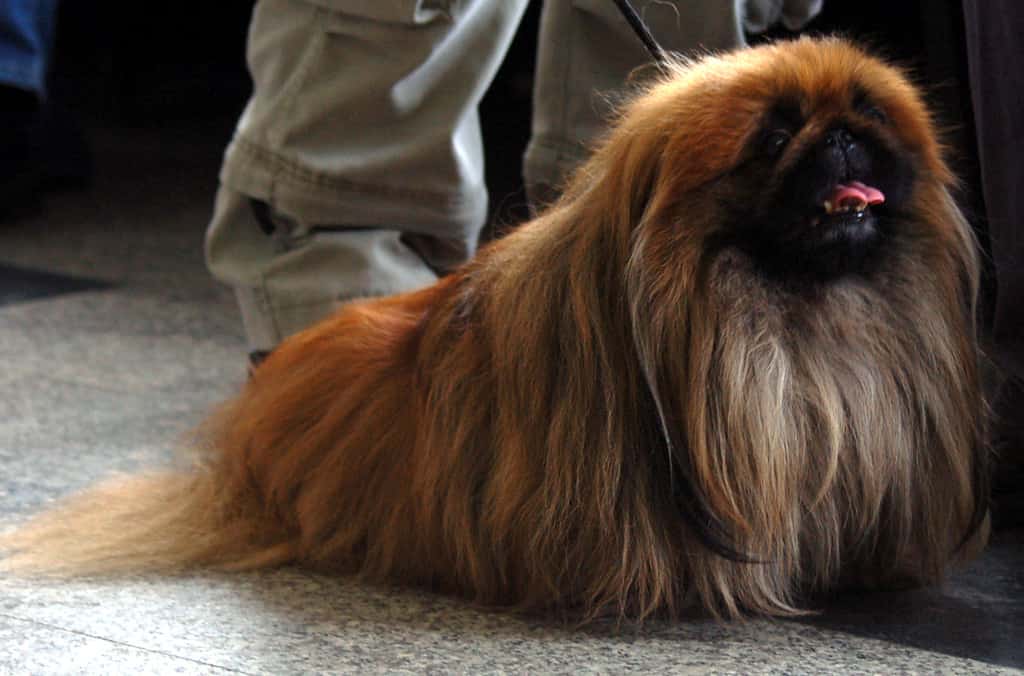
Pekingese
aren’t exactly known for their athletic capabilities, and swimming is no exception.
©Lilly M, CC BY-SA 3.0 <http://creativecommons.org/licenses/by-sa/3.0/>, via Wikimedia Commons – Original / License
Pekingese dogs are also not very good swimmers due to the usual reasons: their dense coats, flat faces, and small stature with short legs. They’re also not very athletic, so it’s best to avoid swimming long distances with them.
Tips for Dog Breeds That Hate Swimming and the Water
If you still want to take your dog to the beach or pool with you, you certainly can!
However, don’t expect them to jump for joy about the experience or be great at swimming if they’re not built for this activity. Be mindful and gentle with your pupper at all times.
Still, with the right precautions and strategies, you can create a pleasant experience for both you and your pal.
- DON’T throw your dog in the water. This will only cause extra stress for them, and may even make them lose trust in you.
- DON’T let your dog swim unsupervised, especially if their breed is on this list.
- DO make them comfortable while in the water. Start by splashing in shallow waters and gradually make your way to deeper areas. Also, try to swim near them until they get more confident in their abilities.
- DO invest in a doggie life jacket if you think this will make both you and your doggo more comfortable, or if you believe it to be necessary.
- DO try swimming with other, more experienced dogs that could teach your pal the ropes.
Summary of the Top 15 Dog Breeds That Hate Swimming and the Water
| Rank | Dog Breeds That Hate Swimming |
|---|---|
| #1 | Bulldogs |
| #2 | Pugs |
| #3 | Corgis |
| #4 | Chihuahua |
| #5 | Greyhound |
| #6 | Dachshund |
| #7 | Shih tzu |
| #8 | Bull Terrier |
| #9 | Basset Hounds |
| #10 | Boxers |
| #11 | Bichon Frise |
| #12 | Yorkshire Terrier |
| #13 | Maltese |
| #14 | Pomeranian |
| #15 | Pekingese |
FAQs
Is swimming stressful for dogs?
Swimming is not stressful for most dogs. Quite the contrary! It can aid their physical and mental well-being, providing them with much-needed relaxation and stress relief. You could think of swimming as the doggo version of meditation! However, this doesn’t apply if your dog is physically not built for swimming. In that case, being in the water can turn into a stressful experience.
How long should a dog swim?
An average dog should swim for around 30 minutes to get the health benefits from the activity. However, beginners may need to keep their swimming sessions shorter to preserve energy and prevent overexertion.
Do dogs get tired after swimming?
Yes, dogs get tired after swimming — just like humans!
The photo featured at the top of this post is © Denis Moskvinov/Shutterstock.com
Ready to discover the top 10 cutest dog breeds in the entire world?
How about the fastest dogs, the largest dogs and those that are -- quite frankly -- just the kindest dogs on the planet? Each day, AZ Animals sends out lists just like this to our thousands of email subscribers. And the best part? It's FREE. Join today by entering your email below.
Thank you for reading! Have some feedback for us? Contact the AZ Animals editorial team.







